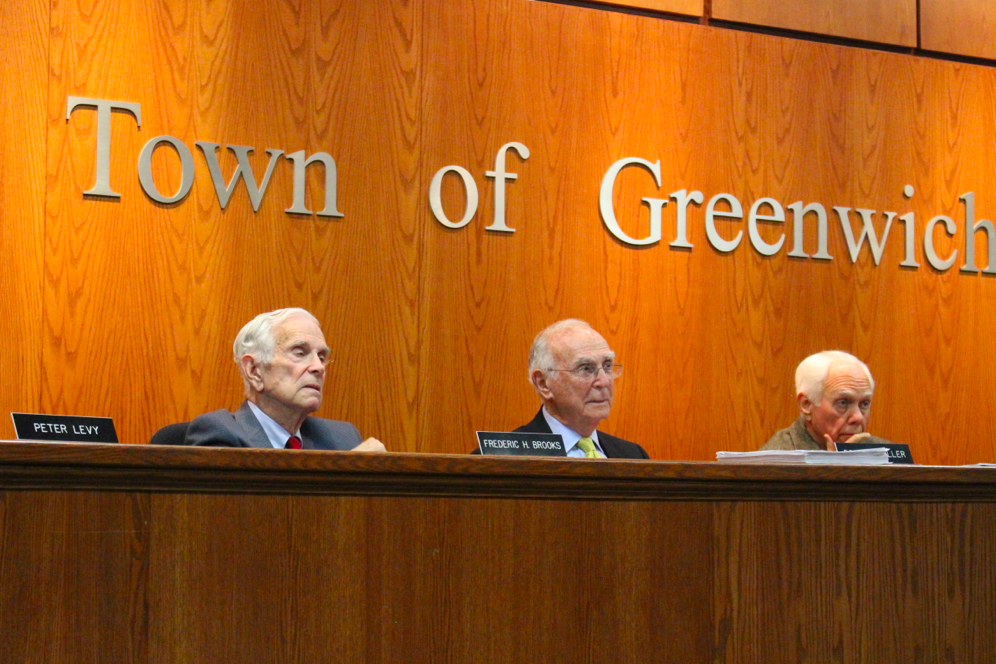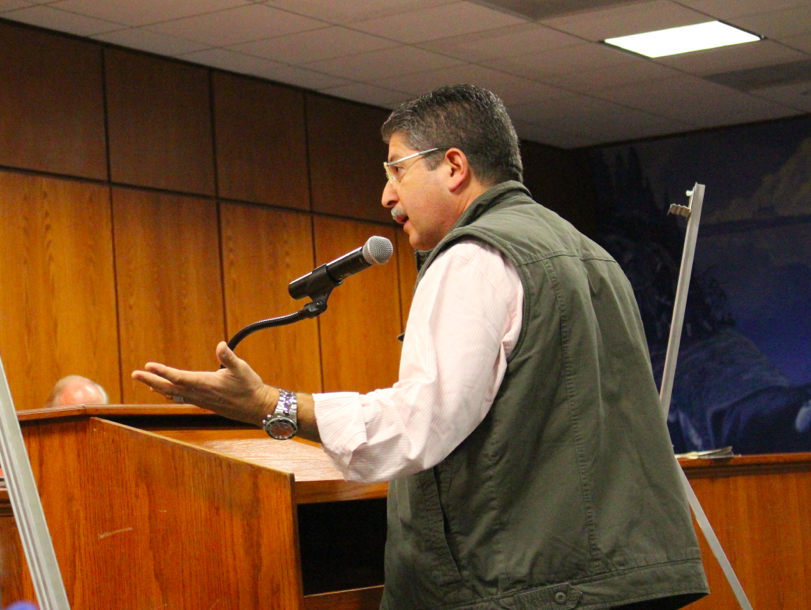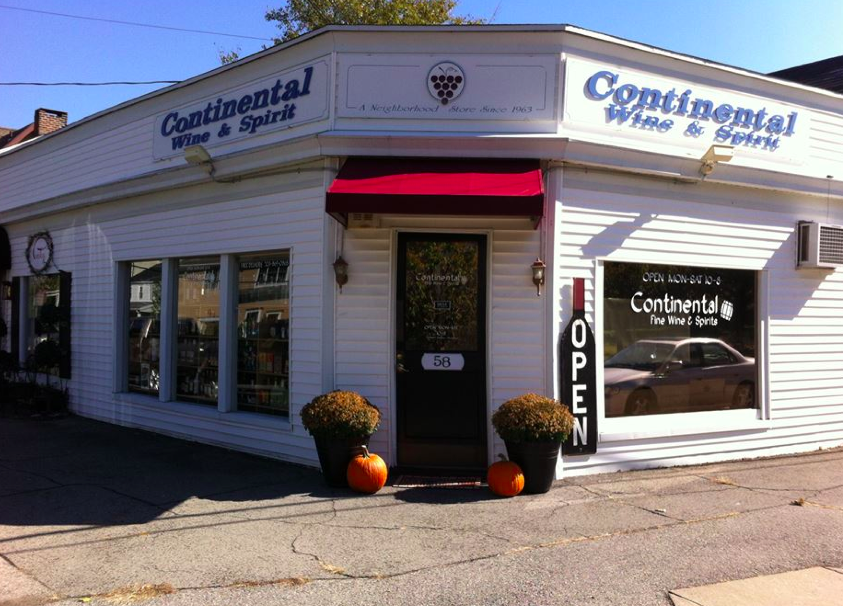 Extensive discussion stemmed from Dan Negrea’s application for an amendment to the Town’s regulations that require package stores be 1,000 ft from one another. King’s Market in Old Greenwich wants to provide customers a wine section on the property at 26 Arcadia Rd.
Extensive discussion stemmed from Dan Negrea’s application for an amendment to the Town’s regulations that require package stores be 1,000 ft from one another. King’s Market in Old Greenwich wants to provide customers a wine section on the property at 26 Arcadia Rd.
Dan Negrea of Kings was represented Tuesday by lawyer, Jane Hogeman, who addressed the commission, followed by members of the community who took turns at the mic, along with package store owners who arrived bearing customer petitions opposing Kings proposed wine store. The points of view were disparate.
Around midnight, when most of the meeting room seats were vacated, the commission’s discussion did result in a consensus was reached, and the 1,000 ft separation voted down.
At the outset of the meeting, Attorney Jane Hogeman, representing Mr. Negrea, was reminded that the P&Z commission was not convened to discuss liquor stores in supermarkets, but rather to look at the 1,000 ft separation requirement.
She argued that the law, on the books since 1940, inhibits competition.
The State has controlled the issue of liquor licenses since the repeal of Prohibition of 1933. And while the Town does not directly control the number of liquor licenses, it did create a law requiring 1,000 ft distance between restaurants and bars and between package stores. That law went into effect in 1940.
This is something of a de facto limit on the number of liquor stores, because, for example, 1,000 ft is equivalent to 5 city blocks. That would translate to Greenwich Ave accommodating just one liquor store.
State of Connecticut Cap on Number of Liquor Stores
Hogeman said that in 1986 the state put a cap on package store licenses and Greenwich is capped at 24. In 1980 Greenwich had 38 package stores. Today, Hogeman said a call to the state indicated there are 22.
“We are below the state cap,” she said of Greenwich, adding that the 1940 town 1,000 ft rule was a way to control the number of liquor licenses and liquor stores, but, she added, “But now the state is controlling the numbers. If we had 40 package stores grandfathered over our maximum, we might have a job for the Town, but we don’t.”
“I think that the market forces are the ones that will naturally settle out with an equilibrium of distribution. I don’t think it’s reasonable to think there would be an influx of package stores to one part of town.” – Attorney, Jane Hogeman
Mrs. Ramer recalled that the Town 15 years ago overhauled regulations, and that the 1,000 ft separation law was retained. Mrs. Hogeman suggested that decision was mostly targeting restaurants with liquor licenses.
In Favor of the 1,000 Ft Separation Rule: Package Store Owners and Some Residents
Mark Armstrong of Riverside said liquor stores do carry problems. “Liquor stores have a different connotation than a flower shop,” he said. “Making access to liquor easier is not a solution. I don’t know where the 1,000 ft came from, but if you can control it and keep it in the industrial section… and let’s call them liquor stores, not package stores, because that’s what it is.”
Don Saunders, an Old Greenwich resident for over 25 years, said he hadn’t heard anything convincing him that the 75-year rule needed to be changed. “There’s really no need for three liquor stores in Old Greenwich,” he said.
State Rep (R-151) Fred Camillo said the 1,000 ft rule had served the community well and voiced concerned that changing it might result in unintended consequences down the road.

Mike Sabatino, the owner of Continental Fine Wines and Spirits at 58 William St spoke about low profit margins selling liquor and how eliminating the 1,000 ft separation between package stores would kill his business. Credit: Leslie Yager
Mike Sabatino, the owner of Continental Fine Wines and Spirits at 58 William Street said that after he lost his international shipping job, he purchased the store to support his wife and kids and pay his mortgage. He said the store had been in business 51 years and at its current location for 36 years.
Sabatino described his business as a neighborhood store. Vehemently opposed to eliminating the 1,000 ft separation rule, he said, “The point you have missed is…You start putting these stores together and somebody’s going out of business,” he said.
“We sell Smirnoff. Smirnoff is Smirnoff. We’re Selling the same thing…
“I barely eek out a living…If it wasn’t for this store, I would be in dire straits. This is very important for every small liquor store in this area. ” – Mike Sabatino, Owner, Continental Fine Wines and Spirits
“What you’re going to have is a Total Wine in Norwalk and a dozen stores go out of business. They lower the price and the guys like myself and some of the people here, need to charge a few dollars more will not exist. The competition is so great.”
Adding that unlike a restaurant where, he said, “You can put six different restaurants next to each other and have six different meatballs, but Smirnoff is Smirnoff. We’re selling the same thing,” he said when asked to compare multiple liquor stores near each other versus, florists, for example.
Customer Petitions
A lawyer for Robert Zalkin of OG Fine Wines delivered a petition signed by 300 customers. He said that if the rule were eliminated, he anticipated an influx of package stores to destinations such as the village of Old Greenwich, which he described as affluent, upscale and charming.
John Martello of Sam’s Package Store in Old Greenwich delivered a petition with 848 signatures of customers.

Hogeman said limiting competition is not one of the purposes of zoning. “That’s really not a reason to hang on to the rule.”
Hogeman asked what the petitions from liquor store owners said.
The headline of both petitions read: “Petition to stop King Market Zoning Application.”
Hogeman said that when Kings Market learned there was a petition, they put a petition up in their store, reading:
“Petition in favor of amending the building zone regulations to remove the 1,000 ft separation from package stores. The undersigned residents of the town of Greenwich support the proposal to remove the 1,000 ft separation for package stores. The state’s limit on the number of package stores per town –24 for Greenwich — is enough to prevent too many package stores. – Kings Stores petition signed by 300 customers on one week
“So, at least, that petition said what it was about,” Hogeman said.
Around 11:30pm the commission set about discussing the 1,000 ft separation rule.
“I think it is an outdated, outmoded regulation,” said Mr. Brooks. “Historically, as it was pointed out to us, it was done by the Town out of a fear there would be too many liquor stores. I don’t think we would be inundated with liquor stores,” he said referring to the state cap on the number of stores in town.
“I think that we normally do not try to protect monopolies, but it seems to me that the regulation does. So I don’t see a reason to protect the status quo, to protect fiefs, and protect their areas — as sympathetic as we may be.”
“I would agree with Fred,” said Mrs. Alban of Mr. Brooks point of view. “The testimony we heard tonight was basically an opposition to having competition, and not really about liquor itself. And the examples that were given to us were that liquor store products are so similar — vodka is vodka.”
As the clock ticked toward midnight, all but one of the P&Z commissioners indicated their willingness to proceed to a vote. Peter Levy, who had suggested more time was needed to reflect and discuss, relented and agreed to participate in a vote.
Mr. Heller said, “We always make motions to approve, never to deny. So, I would make a motion to approve the application eliminating subsection A of section 6 194.” The motion was seconded by Mr. Brooks.
All were in favor except Mr. Maitland, with the vote resulting in the elimination of the 1,000 ft separation.